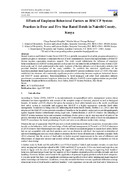| dc.contributor.author | Wanjiku, Chege Peninah | |
| dc.contributor.author | Miricho, Moses | |
| dc.contributor.author | Gesage, Bichage | |
| dc.date.accessioned | 2020-06-13T17:34:56Z | |
| dc.date.available | 2020-06-13T17:34:56Z | |
| dc.date.issued | 2020-04-20 | |
| dc.identifier.issn | 2312-5187 | |
| dc.identifier.issn | 2312-5179 | |
| dc.identifier.uri | https://karuspace.karu.ac.ke/handle/20.500.12092/2400 | |
| dc.description.abstract | Hazard Analysis and Critical Control Point (HACCP) is a globally recognized food safety program advanced as a suitable program to minimize or eliminate the risk of food contamination. Successful implementation of HACCP System requires appropriate employee support. This study sought todetermine the influence of employee behavioral factors on HACCP system practices in four and five star-rated hotels in Nairobi County.A total of 255 hotel cooks and 33 chefs participated in the study. Analysis of the data utilized a set of descriptive statistics that provided detailed description of the study variables. To establish the statistical significance of the hypothesis,multiple linear regression analysis was conductedat 95 percent confidence level (α = 0.05).The study established the existence of a statistically significant positive relationship between employee behavioral factors and HACCP system practices. Rrecommendations to hotel managers and other food production industry practitioners on enhancement of employee behaviour for effective HACCP system implementation are provided. | en_US |
| dc.language.iso | en | en_US |
| dc.publisher | Journal of Tourism, Hospitality and Sports | en_US |
| dc.subject | Employee Behavioral Factors | en_US |
| dc.subject | Food safety | en_US |
| dc.subject | HACCP System Practices | en_US |
| dc.subject | Star-rated hotels | en_US |
| dc.title | Effects of Employee Behavioral Factors on HACCP System Practices in Four and Five Star Rated Hotels in Nairobi County, Kenya | en_US |
| dc.type | Article | en_US |
